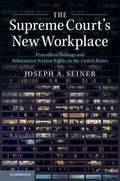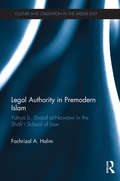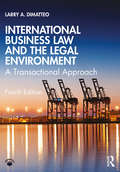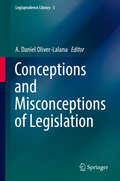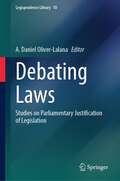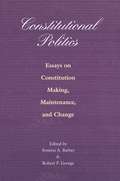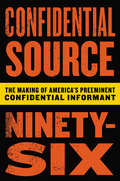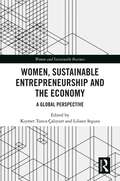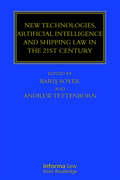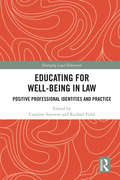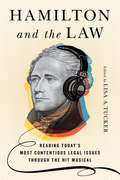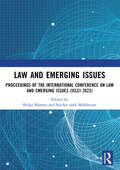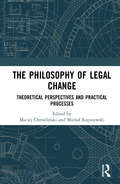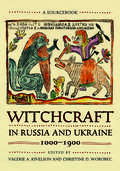- Table View
- List View
The Supreme Court’s New Workplace: Procedural Rulings and Substantive Worker Rights in the United States
by Joseph A. SeinerThe US Supreme Court has systematically eroded the rights of minority workers through subtle changes in procedural law. This accessible book identifies and describes how the Supreme Court's new procedural requirements create legal obstacles for civil-rights litigants, thereby undermining their substantive rights. Seiner takes the next step of providing a framework that practitioners can use to navigate these murky waters, allowing workers a better chance of prevailing with their claims. Seiner clearly illustrates how to effectively use his framework, applying the proposed model to one emerging sector - the on-demand industry. Many minority workers now face pervasive discrimination in an uncertain legal environment. This book will serve as a roadmap for successful workplace litigation and a valuable resource for civil-rights research. It will also spark a debate among scholars, lawyers, and others in the legal community over the use of procedure to alter substantive worker rights.
Legal Authority in Premodern Islam: Yahya B Sharaf Al-Nawawi in the Shafi'i School of Law (Culture and Civilization in the Middle East)
by Fachrizal A. HalimOffering a detailed analysis of the structure of authority in Islamic law, this book focuses on the figure of Yahyā b. Sharaf al-Nawawī, who is regarded as the chief contributor to the legal tradition known as the Shāfi'ī madhhab in traditional Muslim sources, named after Muhammad b. Idrīs al-Shāfi'ī (d. 204/820), the supposed founder of the school of law. Al-Nawawī’s legal authority is situated in a context where Muslims demanded to stabilize legal disposition that is consistent with the authority of the madhhab, since in premodern Islamic society, the ruling powers did not produce or promulgate law, as was the case in other, monarchic civilizations. Al-Nawawī’s place in the long-term formation of the madhhab is significant for many reasons but for one in particular: his effort in reconciling the two major interpretive communities among the Shāfi'ites, i.e., the tarīqas of the Iraqians and Khurasanians. This book revisits the history of the Shāfi'ī school in the pre-Nawawic era and explores its later development in the post-Nawawic period. Presenting a comprehensive picture of the structure of authority in Islamic law, specifically within the Shafi’ite legal tradition, this book is an essential resource for students and scholars of Islamic Studies, History and Law.
International Business Law and the Legal Environment: A Transactional Approach
by Larry A. DiMatteoThe fourth edition of International Business Law and the Legal Environment: A Transactional Approach gives business and law students a clear understanding of the legal principles that govern international business. This book goes beyond compliance by emphasizing how to use the law to create value and competitive advantage. DiMatteo’s transactional approach walks students through key business transactions—from import and export, contracts, and finance to countertrade, dispute resolution, licensing, and more—giving them both context and providing real-world applications. More concise than previous editions, this new edition also features: • Added coverage of new technologies, such as smart contracts, digital platforms, and blockchain technology • Discussion of businesses and sustainability, climate change, and creating a circular economy • Greater focus on UNIDROIT Principles and a review of INCOTERMS 2020 • Expansion of common carrier coverage to include CMI trucking and CMR railway conventions • International perspective and use of a variety of national and international law materials • Great coverage of EU substantive law Upper-level undergraduate and postgraduate students of business law and international business will appreciate DiMatteo’s lucid writing style, and professionals will find this book to be a comprehensive resource. Online resources include an instructor’s manual, PowerPoint slides, test bank, and other tools to provide additional support for students and instructors.
Conceptions and Misconceptions of Legislation (Legisprudence Library #5)
by A. Daniel Oliver-LalanaThis volume brings together an international group of legal scholars to discuss different approaches to lawmaking. As well as reflecting the diversity of legisprudence as a re-emerging academic field, it offers a broad overview of current developments and challenges in the theory of legislation, and aspires, moreover, to counterbalance some questionable ideas or misconceptions, widespread among jurists, on what making laws entails. The book is organized into three parts. The first comprises a sample of ‘ways and models of legislation’, ranging from classic legislative ideals to contemporary forms of regulation. The essays in this part, variances of focus notwithstanding, revolve around the notions of legislative rationality, quality, effectiveness, and legitimacy, which may be regarded as the cornerstones of legisprudence. Interwoven with these notions is another core legisprudential concern: the justification of laws. We address it separately in the next part by exploring the connection between lawmaking, argumentation and constitutional democracy: under the heading ‘legislation in a culture of justification’, a number of aspects of this connection are tackled that have not been sufficiently considered so far in legisprudential literature, such as the intricacies of legislative reasoning and balancing, or the justificatory problems posed by special-interest legislation. The under privileged status of legisprudence in legal studies and the need for socially attentive and citizen-oriented legislative research come to the fore in the third part of the book which turns to the relationships between ‘legisprudence, lawyers, and citizens’. All in all, the thirteen articles gathered here provide a stimulating insight into the theory of legislation, and can hopefully contribute to the reconciliation of the study of law and the study of its making.
Debating Laws: Studies on Parliamentary Justification of Legislation (Legisprudence Library #10)
by A. Daniel Oliver-LalanaThis book seeks to explore the potential and actual value of parliamentary debates as a source of legislative justification. Drawing on a sample of recent Spanish legislation, the papers collected here analyse (critically) the rationale of several laws or legislative measures as it can be reconstructed from the respective parliamentary discussions. All issues covered have given rise to intense political, legal and social controversy: they range from the combat against gender violence, the legal status of bullfighting, the protection of crime victims and the so-called ‘push-backs’ at the border, to the regulation of euthanasia, the minimum living income, underage girls’ access to abortion, and joint child custody. The volume is organised into two main parts. The first group of case studies adopt a legisprudential perspective and examine parliamentary deliberations in the light of the theory and methodology of legislative justification; the contributions in the second part follow approaches that fall outside – but are largely compatible with –legisprudence, and deal with aspects such as the rhetorical strategies employed by MPs when debating bills, and the role of elected legislators as constitutional interpreters.
Constitutional Politics: Essays on Constitution Making, Maintenance, and Change
by A. Barber & Robert P. GeorgeWhat does it mean to have a constitution? Scholars and students associated with Walter Murphy at Princeton University have long asked this question in their exploration of constitutional politics and judicial behavior. These scholars, concerned with the making, maintenance, and deliberate change of the Constitution, have made unique and significant contributions to our understanding of American constitutional law by going against the norm of court-centered and litigation-minded research. Beginning in the late 1970s, this new wave of academics explored questions ranging from the nature of creating the U.S. Constitution to the philosophy behind amending it. In this collection, Sotirios A. Barber and Robert P. George bring together fourteen essays by members of this Princeton group--some of the most distinguished scholars in the field. These works consider the meaning of having a constitution, the implications of particular choices in the design of constitutions, and the meaning of judicial supremacy in the interpretation of the Constitution. The overarching ambition of this collection is to awaken a constitutionalist consciousness in its readers--to view themselves as potential makers and changers of constitutions, as opposed to mere subjects of existing arrangements. In addition to the editors, the contributors are Walter F. Murphy, John E. Finn, Christopher L. Eisgruber, James E. Fleming, Jeffrey K. Tulis, Suzette Hemberger, Stephen Macedo, Sanford Levinson, H. N. Hirsch, Wayne D. Moore, Keith E. Whittington, and Mark E. Brandon.
Confidential Source Ninety-Six: The Making Of America's Preeminent Confidential Informant
by C. S. 96A HARROWING JOURNEY INSIDE THE HIDDEN WORLD OF DRUG CARTELS BY ONE OF THE TOP CRIMINAL INFORMANTS IN U.S. LAW ENFORCEMENT HISTORY.The men he put behind bars know him as Roman Caribe or one of the dozens of other aliases he has used undercover. His handlers in the DEA, ICE, and FBI know him as Confidential Source Ninety-Six, or C.S. 96, named for the year he confronted the sins of his life atop a massive drug distribution ring and flipped, becoming law enforcement's secret weapon. In Confidential Source Ninety-Six, Caribe tells the extraordinary story of his transformation into America's most successful informant in terms of total narcotics seized--from the years of trafficking cocaine and marijuana across the U.S. for a terrifying drug lord, eventually becoming that man's number two, to his decision to defect and trade sides. In his first mission, Caribe set his sights on his onetime boss's brutal operation. In his next, he broke all protocol and made a daring foray into the notorious Fuentes Cartel, where he took down a family that was smuggling tons of drugs across the U.S.-Mexico border.As Caribe launched his career as a confidential source, finding his faith and seeking to finally do right by his stoic wife, Inez, and his four children, his marriage became stressed in new ways, the risks to his family unimaginable if he made a single mistake on the job. He found himself looking over his shoulder every day, knowing that with each drug ring or kingpin he destroyed, he made another dangerous enemy. For as long as he continued the high stakes work, he would survive on the cunning of his tradecraft and his ability to improvise in the most terrifying circumstances. Unfolding in Southern California mansions, makeshift DEA trailers deep in the redwood forest, drug fronts in Spanish Harlem, fast-food parking lots where kilograms of cocaine and heroin change hands, and around the dinner table where Caribe began mentoring at-risk youth to help them avoid the mistakes he made, Confidential Source Ninety-Six is the epic saga of one man's quest to redeem himself and a thrilling look at the law enforcement battle that rages in the shadows of our nation.
Women, Sustainable Entrepreneurship and the Economy: A Global Perspective (Women and Sustainable Business)
by K 305 ymet Tunca Çalı Yurt Liliane SeguraWhen a woman decides to become an ‘entrepreneur,’ she starts her business with a sense of excitement, freedom, wealth, happiness, prestige; however, these feelings can soon turn to fears over debt, difficulties, unpaid invoices, stress, and uncertainty. Being an entrepreneur means taking risks, making decisions, adapting management styles in line with developmental needs, clashing with rivals, being more agile than competitors, negotiating risky scenarios, following business trends, capturing new opportunities before, and being better than the competition. If a woman wants to be successful as an entrepreneur, she needs to have a business education, undergo continued professional development, and have patience and emotional intelligence. Supporting women in their entrepreneurial activities has been shown to positively affect the economy, which is why governments pay special attention to opening new funding opportunities and training programs for women who want to start or develop a business. Female entrepreneurship has individual characteristics because of those aspects of the business which are affected by cultural, technological, legislative, social, and historical developments. This book discusses the relationship between female entrepreneurship and the economy, and academic authors from developing countries such as Brazil, Turkey, Albania, Kosovo, Portugal, and Malaysia analyze the developments encompassing women and entrepreneurship in their respective countries. The authors discuss the regulatory frameworks of each country to show how these either help or hinder female entrepreneurship, and consequently, the place of women in the economy. Women and entrepreneurship is an emerging theme, and this book is a must-read for researchers from both developing and developed countries.
New Technologies, Artificial Intelligence and Shipping Law in the 21st Century (Maritime and Transport Law Library)
by Bar 305 351 Professor Soyer Andrew TettenbornNew Technologies, Artificial Intelligence and Shipping Law in the 21st Century consists of edited versions of the papers delivered at the Institute of International Shipping and Trade Law’s 14th International Colloquium at Swansea Law School in September 2018. Written by a combination of top academics and highly experienced legal practitioners, these papers have been carefully co-ordinated to give the reader a first-class insight into the issues surrounding new technology and shipping. The book is set out in three parts: Part I offers a detailed and critical analysis of issues that are emerging, and those that are likely to emerge, from the use of advanced computer technology, particularly at the contracting process and in the context of issuing trading documents. Part 2 focusses on artificial intelligence and discusses the contemporary issues that will emerge once autonomous ships and similar crafts are put to use in the world’s oceans. As well as this, the legal impact of ports utilising artificial intelligence and computer technology will also be considered. Part 3 analyses how the increasing use of legal technology is changing insurance underwriting and shipping litigation. An invaluable guide to the recent technological advances in shipping, this book is vital reading for both professional and academic readers.
Educating for Well-Being in Law: Positive Professional Identities and Practice (Emerging Legal Education)
Bringing together the current international body of knowledge on key issues for educating for well-being in law, this book offers comparative perspectives across jurisdictions, and utilises a range of theoretical lenses (including socio-legal, psychological and ethical theories) in analysing well-being and legal education in law. The chapters include innovative and tested research methodologies and strategies for educating for well-being. Asking and answering the question as to whether law is special in terms of producing psychological distress in law students, law teachers and the profession, and bringing together common and opposing perspectives, this book also seeks to highlight excellent practice in promoting a positive professional identity at law school and beyond resulting in an original contribution to knowledge, and new discourses of analysis.
Hamilton and the Law: Reading Today's Most Contentious Legal Issues through the Hit Musical
Since its Broadway debut, Hamilton: An American Musical has infused itself into the American experience: who shapes it, who owns it, who can rap it best. Lawyers and legal scholars, recognizing the way the musical speaks to some of our most complicated constitutional issues, have embraced Alexander Hamilton as the trendiest historical face in American civics. Hamilton and the Law offers a revealing look into the legal community's response to the musical, which continues to resonate in a country still deeply divided about the reach of the law. A star-powered cast of legal minds—from two former U.S. solicitors general to leading commentators on culture and society—contribute brief and engaging magazine-style articles to this lively book. Intellectual property scholars share their thoughts on Hamilton's inventive use of other sources, while family law scholars explore domestic violence. Critical race experts consider how Hamilton furthers our understanding of law and race, while authorities on the Second Amendment discuss the language of the Constitution's most contested passage. Legal scholars moonlighting as musicians discuss how the musical lifts history and law out of dusty archives and onto the public stage. This collection of minds, inspired by the phenomenon of the musical and the Constitutional Convention of 1787, urges us to heed Lin-Manuel Miranda and the Founding Fathers and to create something new, daring, and different.
How to Win Your Personal Injury Claim (6th edition)
The attorney author provides tips on both claims that consumers can handle themselves and those requiring working with a lawyer. Matthews discusses how fault is legally determined and covers all phases of the claim process. Helpful features include insurance contact information by state, sample documentation, and an accident claim worksheet. Annotation ©2004 Book News, Inc., Portland, OR (booknews.com)
Law and Emerging Issues: Proceedings of the International Conference on Law and Emerging Issues (ICLEI 2023)
In the ever-evolving landscape of law and governance, adaptation and innovation are key to addressing the challenges of our times. This edited volume is a testament to the ever-evolving nature of the legal field and the ongoing efforts of legal scholars and academicians to dissect, analyze, and grapple with the challenges and opportunities presented by these changes. The topics covered in this book span a wide spectrum of legal domains, reflecting the complex and rapidly changing nature of our contemporary world. From corporate governance structures to emerging challenges in the digital space, from analyzing the implications of the Social Security Code 2020 in India to understanding the legal developments surrounding unorganized migrant workers during the COVID-19 pandemic, the breadth of subjects addressed here is both impressive and vital.
Living with Animals: Bonds across Species
Living with Animals is a collection of imagined animal guides—a playful and accessible look at different human-animal relationships around the world. Anthropologists and their co-authors have written accounts of how humans and animals interact in labs, in farms, in zoos, and in African forests, among other places. Modeled after the classic A World of Babies, an edited collection of imagined Dr. Spock manuals from around the world—With Animals focuses on human-animal relationships in their myriad forms.This is ethnographic fiction for those curious about how animals are used for a variety of different tasks around the world. To be sure, animal guides are not a universal genre, so Living with Animals offers an imaginative solution, doing justice to the ways details about animals are conveyed in culturally specific ways by adopting a range of voices and perspectives. How we capitalize on animals, how we live with them, and how humans attempt to control the untamable nature around them are all considered by the authors of this wild read.If you have ever experienced a moment of "what if" curiosity—what is it like to be a gorilla in a zoo, to work in a pig factory farm, to breed cows and horses, this book is for you. A light-handed and light-hearted approach to a fascinating and nuanced subject, Living with Animals suggests many ways in which we can and do coexist with our non-human partners on Earth.
The Philosophy of Legal Change: Theoretical Perspectives and Practical Processes
Democratic legal systems have recently been subject to rapid and multi-directional processes of change. There are numerous sociological, technological, ideological, or purely political processes which result in law’s amendment and transformation. This book argues that this legal change is best understood from a political philosophy perspective. This can be used as an interpretative device to understand the ongoing processes of change as well as their outcomes such as new laws, judicial interpretations, or constitutional amendments. The work has three main objectives: to provide deeper understanding of the problems of legal change within the diversity of Western political and legal thought; to examine the development of the processes of change in terms of their normative and prudential acceptability; to interpret actual processes of change with a view to the general theoretical and normative background. The book is divided into three parts: Part I sets the scene and is focused on the general issues important for understanding and evaluating legal change from the perspective of political philosophy; Part II focuses on the spectrum of politico-philosophical justifications present in the political culture of democratic states; Part III offers selected case studies to specify and apply the philosophical ideas in the previous parts. The book will be a valuable resource for students and scholars of law and jurisprudence, including comparative legal studies and human rights law, political theory, and philosophy.
Witchcraft in Russia and Ukraine, 1000–1900: A Sourcebook (NIU Series in Slavic, East European, and Eurasian Studies)
This sourcebook provides the first systematic overview of witchcraft laws and trials in Russia and Ukraine from medieval times to the late nineteenth century. Witchcraft in Russia and Ukraine weaves scholarly commentary with never-before-published primary source materials translated from Polish, Russian, and Ukrainian. These sources include the earliest references to witchcraft and sorcery, secular and religious laws regarding witchcraft and possession, full trial transcripts, and a wealth of magical spells. The documents present a rich panorama of daily life and reveal the extraordinary power of magical words.Editors Valerie A. Kivelson and Christine D. Worobec present new analyses of the workings and evolution of legal systems, the interplay and tensions between church and state, and the prosaic concerns of the women and men involved in witchcraft proceedings. The extended documentary commentaries also explore the shifting boundaries and fraught political relations between Russia and Ukraine.
